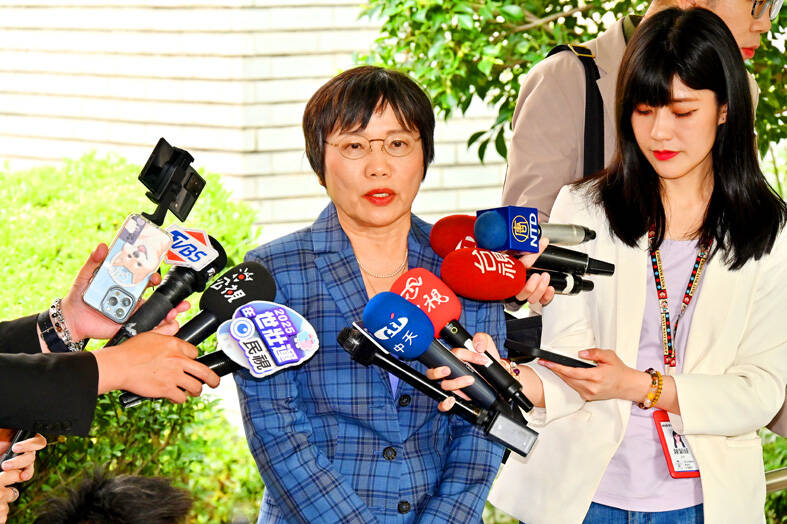The Ministry of the Interior on Thursday launched a new system for tour groups visiting China to voluntarily register their travel dates, itinerary and purpose for safety reasons.
The “Open Platform on Visit Exchange Programs in China” for religious groups and other organizations was launched at https://twexchange.moi.gov.tw/.
The ministry encourages organizations to register their travel information on the platform when visiting China, but registration is not mandatory, Minister of the Interior Liu Shyh-fang (劉世芳) told reporters yesterday.

Photo: George Tsorng, Taipei Times
Voluntary registration would help safeguard the safety of group members and provide the public with greater transparency about when and where such visits are taking place, Liu said.
The registration system is intended primarily for organizations, such as religious groups, business associations and private-sector entities, not individual travelers, she said.
There are no plans for registration to become mandatory, she said, adding that personal privacy and data would be protected in accordance with privacy laws.
The ministry would not monitor or penalize groups that choose not to register, she added.
Taiwan is home to more than 12,000 registered religious groups, but even those that have not formally registered with the government are welcome to use the platform, Liu said.
There are 15 data fields on the platform that would be publicly viewable, including group name, activity detail, travel dates, places and purpose of the visit, Department of IT Service Director-General Huang Kuo-yu (黃國裕) said.
Other details — such as the number of group members, contact person, group leader, phone numbers and emergency contact on the Chinese side — would not be made public, Huang said.
Department of Civil Affairs Director-General Cheng Ying-hung (鄭英弘) said that a separate registration platform would come online soon for elected civil servants traveling to China.
Taiwan has 11,023 such elected representatives, Cheng said.
“We will notify local government offices with instructions on how to register, and also provide the contact information of the dedicated ministry officer for the platform,” Cheng said.
“We shall also send notifications to encourage elected representatives to proactively provide information on their exchanges to China,” he said, adding that they should do so on a voluntary basis, as current laws do not mandate the reporting of such trips.
As for whether the system would monitor “united front” activities by China, Liu yesterday said that any such matters would be handled in accordance with the law.
If there is any involvement in “united front” efforts, including contraventions of the National Security Act (國家安全法) or Anti-Infiltration Act (反滲透法), they would be investigated and dealt with based on the facts, she said.
Asked whether the platform is intended to restrict cross-strait exchanges, Mainland Affairs Council Minister Chiu Chui-cheng (邱垂正) said that as long as the exchanges are based on mutual respect, comply with regulations and are sustainable, they would be viewed positively.
The ministry encourages groups to disclose their travel information through the system so that authorities can remind groups of related risks and ensure they return safely, Chiu said.
He expressed the council’s support for the measure.
Additional reporting by CNA

STAY AWAY: An official said people should avoid disturbing snakes, as most do not actively attack humans, but would react defensively if threatened Taitung County authorities yesterday urged the public to stay vigilant and avoid disturbing snakes in the wild, following five reported snakebite cases in the county so far this year. Taitung County Fire Department secretary Lin Chien-cheng (林建誠) said two of the cases were in Donghe Township (東河) and involved the Taiwan habus, one person was bit by a Chinese pit viper near the South Link Railway and the remaining two were caused by unidentified snakes. He advised residents near fields to be cautious of snakes hiding in shady indoor areas, especially when entering or leaving their homes at night. In case of a

A magnitude 6.4 earthquake struck off the coast of Hualien County in eastern Taiwan at 7pm yesterday, the Central Weather Administration (CWA) said. The epicenter of the temblor was at sea, about 69.9km south of Hualien County Hall, at a depth of 30.9km, it said. There were no immediate reports of damage resulting from the quake. The earthquake’s intensity, which gauges the actual effect of a temblor, was highest in Taitung County’s Changbin Township (長濱), where it measured 5 on Taiwan’s seven-tier intensity scale. The quake also measured an intensity of 4 in Hualien, Nantou, Chiayi, Yunlin, Changhua and Miaoli counties, as well as

Credit departments of farmers’ and fishers’ associations blocked a total of more than NT$180 million (US$6.01 million) from being lost to scams last year, National Police Agency (NPA) data showed. The Agricultural Finance Agency (AFA) said last week that staff of farmers’ and fishers’ associations’ credit departments are required to implement fraud prevention measures when they serve clients at the counter. They would ask clients about personal financial management activities whenever they suspect there might be a fraud situation, and would immediately report the incident to local authorities, which would send police officers to the site to help, it said. NPA data showed

ENERGY RESILIENCE: Although Alaska is open for investments, Taiwan is sourcing its gas from the Middle East, and the sea routes carry risks, Ho Cheng-hui said US government officials’ high-profile reception of a Taiwanese representative at the Alaska Sustainable Energy Conference indicated the emergence of an Indo-Pacific energy resilience alliance, an academic said. Presidential Office Secretary-General Pan Men-an (潘孟安) attended the conference in Alaska on Thursday last week at the invitation of the US government. Pan visited oil and gas facilities with senior US officials, including US Secretary of the Interior Doug Burgum, US Secretary of Energy Chris Wright, Alaska Governor Mike Dunleavy and US Senator Daniel Sullivan. Pan attending the conference on behalf of President William Lai (賴清德) shows a significant elevation in diplomatic representation,